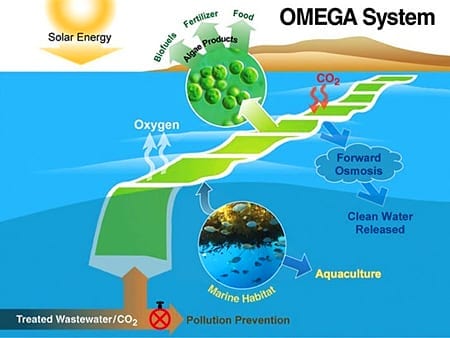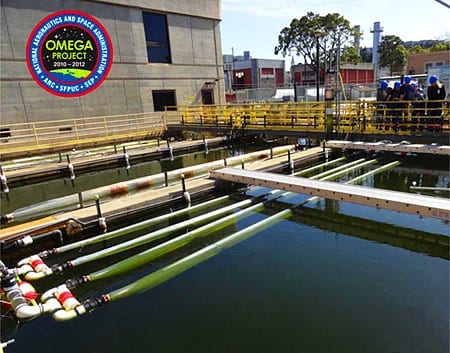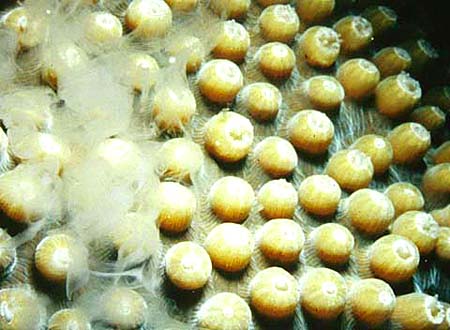By Daniel de la Calle
Two news, one good and one bad. Then the ugly:
THE GOOD: NASA claims to have developed an innovative method called OMEGA (Offshore Membrane Enclosures for Growing Algae), that grows algae, cleans waste-water, captures carbon dioxide and ultimately generates biofuel without competing with agriculture for water, fertilizer or land. Wow.
The system is made up of large flexible plastic tubes called photobioreactors. They float in seawater and contain freshwater algae growing in waste-water. These algae are among the fastest growing plants on Earth. They use energy from the sun, carbon dioxide and nutrients from the waste-water to produce biomass that can be turned into biofuel and other valuable products such as fertilizer and animal food. In the process, the algae clean the waste-water by removing nutrients that would otherwise contribute to forming marine deadzones. Photo: NASA
Photo: NASA
The objective of this project is to investigate the technical feasibility of a unique floating algae cultivation system that could lead to commercial uses. Research by scientists and engineers has so far shown that OMEGA is an effective way to grow microalgae and treat waste-water on a small scale.
NASA is analyzing the OMEGA system as an alternative way to generate aviation fuels. Potential implications of replacing fossil fuels include reducing the release of green house gases, decreasing ocean acidification and enhancing national security. 
Photo: NASA
OMEGA Project Accomplishments:
(NASA OMEGA project: Jan 2010 – May 2012)
• Demonstrated controlled microalgae growth on waste-water in floating PBRs.
• Operated 100, 200, 1,600, and 3,200-liter PBR systems for repeated algal growth cycles.
• Showed that forward osmosis could be potentially coupled with OMEGA to enhance both biomass production and waste-water treatment.
• Showed efficient uptake of CO2 using gas exchange column.
• Developed protocols for harvesting algae and controlling grazers.
• Determined impact of biofouling.
SOURCE
SOURCE 2
THE BAD: A team of researchers from the University of Queensland has studied how Ocean Acidification affects the settlement of baby corals onto a reef. This important study found that the increase in acidity in the oceans has a dramatic effect on their ability to survive. Christopher Doropoulos, lead author of the study, commented that “baby corals are initially found as swimming larvae before they choose their place to attach to the reef and settle for life, a critical step to their survival and the maintenance of coral reefs. […] The coral larvae normally have this amazing ability to settle on one particular type of rock-like seaweed called Titanoderma. This stony seaweed is a safe haven for young corals, yet we found that, as levels of ocean acidification increased, the coral larvae avoided this seaweed and started to settle absolutely anywhere.”
Photo: A male stony coral releases sperm into the water
“Ocean acidification also changed the types of seaweeds available to the corals and had a damaging effect on their preferred species of Titanoderma,” said Mr Doropoulos.
“Our study identifies three major negative impacts of ocean acidification on baby corals. It reduces the number of corals settling, it disrupts their behavior so that they make unwise decisions, and reduces the availability of the most desirable substrate for their survival. This may have severe consequences for how coral reefs function and how they recover from major disturbances.”
SOURCE
THE UGLY:

EXPLANATION


